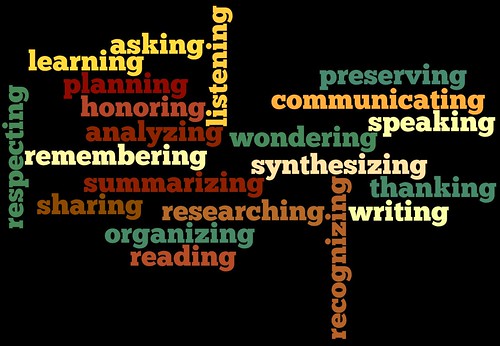In his 2001 book, “High Tech/High Touch. Technology and our Accelerated Search for Meaning,” John Naisbitt argued modern technologies often encourage us to live “distanced and distracted lives.” Certainly that critical observation is even more true ten years later in 2011 with the growing ubiquity of social networking sites and mobile phones than it was in 2001. Yet all technologies and all technology uses do NOT distance and distract. What are those technologies which help us connect with others more closely and bind us closer together in communities? I think this is an important question to consider.
I’m almost finished listing to Kevin Kelly’s thought provoking book, “What Technology Wants,” as an audio book via Audible. Many thanks are due to Bob Sprankle for encouraging me to read it. I’ve taken quite a few notes and have lots to reflect on, but this evening I want to briefly share a quotation and a thought relating to “convivial technologies.” The English Wiktionary defines “convivial” as:
Of or relating to a feast or entertainment, or to eating and drinking, with accompanying festivity; festive; social; gay; jovial.
In “What Technology Wants,” Kelly quotes Ivan Illich‘s book “Tools for Conviviality” and uses the definition, “compatible with life.” He argues “convivial tools enlarge autonomy for individuals and groups,” and therefore are technologies which we should both adopt and champion. In his closing chapter, Kelly argues that “convivial forms of technology can allow us to be better.”
I’m convinced the process of documenting life stories, creating them with media as digital stories, and sharing them together with others is a “highly convivial” use of technology. “Lillie and John” remains one of my favorite digital stories from Storychasers‘ “Celebrate Oklahoma Voices” oral history project, and exemplifies well this idea of a “convivial story.”
I agree with many of the points Kelly makes in his book, and the idea of thoughtfully selecting the technologies we use based on their potential to serve convivial ends in our lives as well as enhance our autonomy and choices are right on target. Too often I think people consider “technology” as a monolithic concept, and want to embrace or reject it as a whole rather than take a more discriminating and thoughtful approach.
What technologies or technology uses strike you as most “convivial,” if we understand that term as Illich and Kelly do: As promoting a richer and fuller living of life? Are there technologies or technology uses you love which draw you closer to other people and make you more acutely aware of the REAL important things in life? Because “storychasing” an oral history interview with someone involves things like listening, wondering, and asking, I think these activities with technology actually “humanize” us as individuals and in groups more than they “distance and distract.” That’s a significant reason I’m passionate about promoting more Storychasing in our communities. Living in our high tech, digital world, we need more convivial technology uses.
If you enjoyed this post and found it useful, subscribe to Wes’ free newsletter. Check out Wes’ video tutorial library, “Playing with Media.” Information about more ways to learn with Dr. Wesley Fryer are available on wesfryer.com/after.
On this day..
- Enter to Win 2 FREE Tickets to iPad Media Camp: July 26-28, 2016 – 2016
- Perspective: The Real Challenge Facing IT in Education #fail-learn – 2012
- Sharing by default and empowering others to share – 2009
- Blogging TCEA 2006: Create, Share & Access – 2009
- Got Storm Stories to Share? – 2008
- Join the NECC 2008 Ning! – 2008
- Updates on OLPC (June 2008) – 2008
- EncycloMedia 2008 session proposals – 2008
- links for 2008-06-16 – 2008
- Safari now available on Windows too! – 2007

